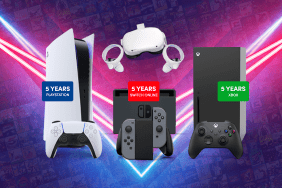This last week of Driveclub server issues has tested the mettle of many PS4 owners. Driveclub‘s PS Plus Edition has been marketed as the first huge deal for PS Plus subscribers, offering more than 15% of the multi-million dollar budget game at no cost. Anticipation was high heading into this week, which quickly metamorphosed into frustration as Sony and Evolution Studios struggled to meet the demand of the hundreds of thousands of players looking to not only play their full priced copy of the game, but try out the free edition.
The issue is apparently so bad that we’re now on our fourth day of the game’s network infrastructure being in shambles. I’ve streamed Driveclub gameplay on Twitch several times, but unfortunately viewers have only been able to see a small portion of the game. Its leaderboards, Club representation, and Faceoffs are a huge part of the package. Many of those who pre-ordered the game still haven’t experienced online, which is truly disappointing.
Reportedly, Driveclub‘s server issues are due to the game’s heavy emphasis on social interaction, where Clubs and Faceoffs turn what may across as a single-player centric game into one that places heavy emphasis on multiplayer. Although Driveclub would be delayed for a year from its original expected release window around the PS4’s launch, preparation of the network infrastructure wasn’t at the level it needed to be in order to have anything remotely resembling a smooth launch.
It’s now 2014. The PS4 isn’t Sony’s first rodeo. Online play became an integral part of the console experience around a decade ago. What was once an industry dominated by single-player and local multiplayer games is now one where virtually every game is expected to have online functionality of some sort, even the likes of Grand Theft Auto and Uncharted, a couple of the most narrative-driven games in gaming.
Even with this, Sony has been a bit of a maverick akin to Nintendo. For all of last gen it stayed true to its free online environment formula, which albeit was a rudimentary one. Sure, it’s been many years since that time, but PS4 is very similar to PS3 in its network capabilities, and sadly its stability. Sony seems to employ a lag strategy with its capacity planning when it comes to the network, never over-expanding, usually bordering on having enough infrastructure to be able to host the massive community of PlayStation gamers.

In the past year we’ve seen a lot of PlayStation Network outages, as well as a few DDoS attacks that have left the network in ruin for days at a time. In the case of Destiny‘s launch, Sony’s most marketed product of the year, its lack of preparation in network security damaged the experience of early adopters. Many were unable to play the game for a day or two as Sony struggled to combat the storm.
The truth is, the moment Sony made PS Plus a requirement to play online, expectations raised drastically. What was once a service that did a lot more than its free price would suggest, would then be judged along the likes of Xbox Live, a service that has been refined constantly since its introduction in 2002 by a company that knows its software inside and out. But determining how successful it is isn’t as simple as just comparing it to its main competitor; PSN has one massive advantage: its outstanding free game line-up and discounts.
There’s no doubt about it, the PS Plus game offerings on PS4 are great, and I would be inclined to say they have been a big part of the reason many PS4 gamers are satisfied at this point in game. At launch, receiving Resogun for free was a godsend. It was the highest rated game on the platform at the time, making its free delivery a fantastic launch day present. Since then, myself and others have been able to enjoy FEZ, Velocity 2X and a variety of other well-received indie titles at no cost. It’ll take a while before it becomes as good as the PS3 roster, which has handed AAA games like Batman: Arkham City and Tomb Raider to gamers for free, but when that becomes the case, I think it’ll be much easier to justify the yearly cost, provided the servers aren’t improved by then.
Also See: 50 Most Memorable Moments in Gaming
Offering these games for free is no small step for Sony. Publishers are paid up-front for the deal. So, yes, you can look at it as a sizable chunk of your PS Plus subscription going toward paying for the PS Plus collection.
So I ask you, if you had the choice to trade the quality of PS Plus’ free game offerings for a more stable and robust online network with more games hosted on dedicated servers, and fewer outages, would you?
I’m not sure which side I lean on. I’ve derived great entertainment value from some of the free games I’ve downloaded, and it’s unlikely I would have ever paid for some of the games I’ve enjoyed along the way. However, playing on XBL, Steam, and other networks where the online play experience seldom tests my patience, I wouldn’t mind seeing what a highly functional PSN would be like.
I think the divide between how people answer this question comes from how extraverted they are with their gaming. Those who just want to play single-player games, which PlayStation has always excelled at, wouldn’t get much from a better network. However, with games like Battlefield 4 selling so well on PS4, anyone who plans to spend weeks competing online with friends could have a lot to gain from Sony adjusting its strategy.






